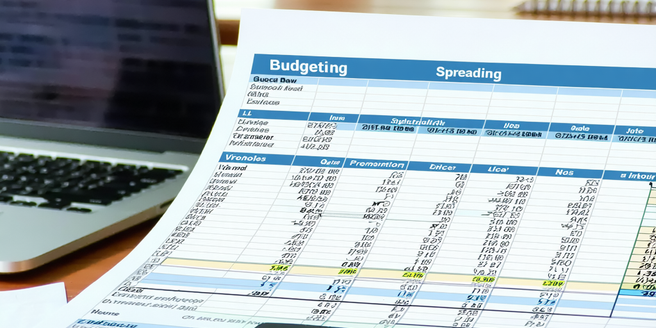Understanding the Basics of Budgeting
| Concept | Explanation | Example |
| Income | All money received | Salary, bonuses |
| Fixed Expenses | Expenses that remain constant | Rent, subscriptions |
| Variable Expenses | Expenses that can vary | Dining out, utilities |
| Savings | Money set aside for future use | Emergency fund, retirement |
| Budget | A plan for income and expenses | Monthly expense spreadsheet |
How Budgeting Helps Improve Credit Scores
Budgeting can play a significant role in improving your credit score. By tracking your expenses closely, you can ensure that bills are paid on time, which is essential for maintaining a good credit history. Additionally, a well-maintained budget can help you identify unnecessary expenses that may be dragging down your overall financial health. Budgeting helps you prioritize debt payments, thus reducing the credit utilization ratio, a key factor in your credit score. When you set a budget, you can allocate funds to pay off outstanding debts faster, thereby positively influencing your credit score. Moreover, sticking to a budget reduces the tendency to resort to credit when overspending, ultimately resulting in lower credit card balances and improved creditworthiness over time.
Setting Financial Goals with Budgeting
Setting financial goals is a cornerstone of effective budgeting. By identifying specific objectives, such as buying a home, saving for retirement, or taking a vacation, you can create a roadmap for your budget. Financial goals provide the motivation required to adhere to your budget, as each financial decision is weighed against achieving these aims. When establishing goals, it’s crucial to ensure they are SMART: Specific, Measurable, Achievable, Relevant, and Time-bound. This structured approach not only creates clarity but also builds confidence in your financial planning. Additionally, sharing your goals with a trusted friend or financial advisor can offer accountability and support. This approach makes tracking progress easier. Visualization of goals, such as through vision boards or savings trackers, can further reinforce commitment to financial discipline.
Tracking Income and Expenses Effectively
Effective tracking of income and expenses is crucial for maintaining a solid budget. Begin by identifying all income sources and recording them diligently. It can be surprising how often you overlook small but recurring income streams. Financial discipline is key to ensuring success in managing your finances. Next, log every expense, no matter how small. This detailed tracking exposes patterns in spending and helps you spot areas where adjustments are needed. Using spreadsheets or budgeting apps simplifies this process, providing features like categorization and automated calculations. It’s essential to review your records regularly, ideally on a weekly or monthly basis, to ensure you are staying on track with your financial plan. Consistent tracking assists in keeping your budget in alignment with your financial goals.
Creating a Realistic Monthly Budget Plan
A realistic monthly budget plan is the foundation of financial stability. Start by listing all income sources and fixed monthly expenses. Include essential variable costs like groceries and commuting. Don’t forget to review and categorize your expenses to track where your money goes. Allocate a portion of the income towards savings. Building an emergency fund should also be part of your financial strategy. It’s crucial to ensure your budget aligns with real-world spending patterns to be sustainable. Set achievable limits on discretionary spending, allowing some flexibility to account for unexpected expenses. Revisiting and adjusting your budget plan every few months is crucial to accommodate changes in income and expenses, ensuring alignment to long-term goals.
Identifying and Reducing Unnecessary Expenses
Identifying and reducing unnecessary expenses can significantly enhance your budgeting success. Start by reviewing your spending habits across categories such as dining out, shopping, and entertainment. Evaluate each expense’s necessity and enjoyment. It’s important to be honest with yourself about what you truly need versus what is simply a want. Consider implementing small changes one step at a time to make the process more manageable. Substitute costly habits with more affordable alternatives, such as cooking at home instead of frequent restaurant visits. Cancel unused subscriptions and memberships. Prioritize spending on experiences or items that genuinely add value to your life. Gradually lowering discretionary expenses frees up funds for savings or debt repayment, aligning your budget more closely with financial objectives without sacrificing quality of life.
Using Budgeting to Pay Down Debt
Budgeting is an effective strategy for paying down debt. Begin by listing all debts, including interest rates and minimum payments. Allocate as much discretionary income as possible towards eliminating high-interest debt first, also known as the debt avalanche method. Alternatively, focus on paying off smaller debts quickly to gain momentum, a technique known as the debt snowball method. Both methods require discipline and commitment to succeed. It’s important to stay motivated and celebrate small victories along the way. Consistently review and adjust your budget to optimize debt reduction efforts. Setting payment reminders or automating transfers ensures timely payments, preventing additional charges or penalties. Achieving debt elimination lightens financial burdens and improves long-term financial health.
The Role of Emergency Funds in Budgeting
Emergency funds play a vital role in effective budgeting by providing a financial cushion for unexpected events such as medical emergencies, job loss, or urgent repairs. Building an emergency fund should be a priority in any budget. It’s important to assess potential risks and estimate the potential costs of emergencies to determine the target amount for your fund. Start small; aim initially to save a month’s worth of expenses, gradually increasing this to three to six months. Even small amounts can add up significantly over time. Consistent monthly contributions, no matter how small, lead to substantial growth over time. An adequately funded emergency reserve reduces the need to rely on credit in crises, preventing debt accumulation and safeguarding financial stability.
Tips for Sticking to Your Budget
Sticking to your budget requires commitment and discipline. Start by setting realistic and attainable goals. Regularly track your expenses and make necessary adjustments. Building in small rewards, such as a treat when achieving savings milestones, can help maintain motivation. Avoid impulsive spending by allowing cooling-off periods for significant purchases. It’s essential to review and revise your budget plan at least once a quarter. Consider discussing your budget plan with a trusted friend or financial advisor for additional insights. Utilize tools and apps designed to automate savings and alert you when nearing budget limits. Finally, regularly revisit your budget plan to reflect changes in your financial situation or goals, ensuring you’re continually aligned with your financial trajectory.
Leveraging Budgeting Apps and Tools
Leveraging budgeting apps and tools simplifies financial management and enhances budgeting discipline. Many apps offer comprehensive features such as expense tracking, goal setting, and automatic categorization of transactions. In today’s fast-paced world, managing finances effectively is more important than ever. With the rise of digital banking, these tools have become even more integrated into daily financial habits. These tools often provide visual insights through graphs and charts, enabling easier monitoring of spending patterns and trends. Notifications and alerts serve as reminders to uphold spending limits and prompt timely bill payments. By integrating banking info, these apps automate data input, saving time and reducing errors. The convenience and accessibility of budgeting apps make them essential for anyone committed to sound financial management.



